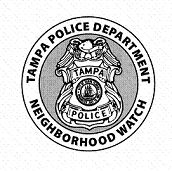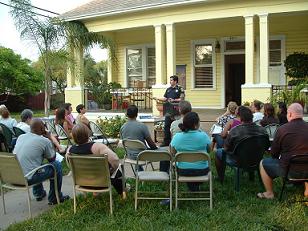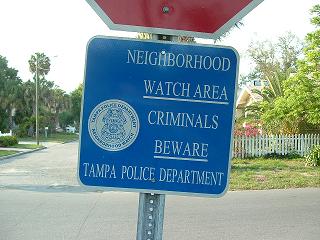Extreme Makeover: NW Legislation Improves Quality of Life for Neighborhood Watch Participants in Florida

The Problem
As a proud and vocal member of her local Neighborhood Watch group, an elderly Tampa resident wasn't about to take the disintegration of her community sitting down. When she saw drug dealers working her street, she'd call them on it. In no uncertain terms, she would tell them that she was a member of her Neighborhood Watch group and that the police would be hearing from her. But when the dealers began not only taunting her but threatening to do physical harm to the woman's pet dog, she began to recognize that there were definite limits to her role.
Major Sophia Teague of the Tampa Police Department recognized those limits, as well. A one-time sergeant with a street-level narcotics squad, Teague had worked very closely with Neighborhood Watch groups, and she had witnessed first-hand the harassment that took place. “While my colleagues and I saw what criminals were doing to Neighborhood Watch participants, many of whom were elderly, there was nothing written on the books that would permit us to arrest them,” she explained.
This deficit prompted Teague to begin researching statutes – both in the state of Florida and throughout the country – in an effort to find any piece of legislation that may serve as a protective measure for those involved in Neighborhood Watch. Lo and behold, however, she found none. “When I did my research, I found statutes that were put in place to protect many different groups – even one that protects police dogs – but there was not one statute in any state that had been written to protect members of Neighborhood Watch groups from being harassed,” explained Teague. “Considering that these people are the eyes and ears of our community who the police rely on to help them solve crimes, I knew something had to be done.”
And Teague wasted no time in taking action. She began reading every statute that dealt with protecting victims, from those centering on protecting a state witness to those focused on safeguarding victims of domestic violence. It wasn't long before she had written her own statute, this one aimed at protecting members of Neighborhood Watch groups who were being harassed by criminals. In 2000, Teague presented her idea to now retired Senator Les Miller, and a three year fight to get the bill passed began.
The Transformation Process
P
While there was support of legislation aimed at protecting Neighborhood Watch members, many in the Florida Senate felt the original bill – which classified harassing Neighborhood Watch participants as a third degree felony – was too harsh. The language of the bill was subsequently changed, making the offense a misdemeanor. Further support was garnered after Senator Miller also called upon an additional colleague to help promote the legislation. “In my first term, Senator Miller asked me to be the House sponsor of the bill, and I agreed and worked the bill so that we could get passage out of the House, which led the way for the Senate to follow suite,” recalled Representative Jennifer Carroll (R-Jacksonville).
Teague continued to play a part, as well, actively promoting the proposed legislation in the community. “When Senator Miller informed me that the bill was receiving positive feedback, I contacted the president of one of our local Neighborhood Watch groups and told him to call every volunteer in Tampa to ask them to call their senators and representatives to remind them that we were watching how they voted on this legislation,” said Teague. The efforts paid off. Not only did the bill move through the House very quickly, it ultimately became the first bill signed by then-Governor Jeb Bush, and in May of 2003, legislation that makes harassing and threatening Neighborhood Watch participants a crime was signed into law.
The Results

Rep. Carroll agrees. “The law has created a measure of safety for individuals so that they are not afraid of thugs,” she said. “It also lets the ‘bad guys' know that the police have the authority to incarcerate and fine them for interfering with the program.” “Now residents have the assurance that judges and the state's attorney's office are backing them,” added Teague.
This assurance has not only helped to increase the number of active groups in Tampa, which has grown to 151, but, according to Maryanne Hunsberger, a Crime Prevention Practitioner with the Tampa Police Department's Crime Prevention Bureau, the resolve of existing groups has sky-rocketed. This is particularly encouraging as multiple members of these groups had once been unwilling to participate because they feared they were putting their own safety at risk. “Because of the legislation, people are no longer afraid to stand up against crime and work in partnership with their local police departments,” she said. “The relationship between police and residents have is at an all-time high.”
As a result of this bolstered partnership, Neighborhood Watch members have a greater comfort level with law enforcement, and regularly contact police to report suspicious activity, which serves as an additional protective measure for the community. “The true test is when one of our members sees someone that he or she doesn't know walking around the community, looking in cars, or exhibiting some sort of behavior that appears suspicious, and that person takes the initiative to contact police,” said Hunsberger. “In the past, members would tell us they didn't want to call police because they didn't know for sure if what they were witnessing was a crime, and they didn't want to bother the police, but we've taught them not to be afraid to call – that we want to hear from them – and it's really paid off.”
What's more, Neighborhood Watch members are no longer anxious about standing up for and taking ownership of their communities because they know they have both the police and the law on their side. “Neighborhood Watch is not only about crime prevention, it's about quality of life issues, and the legislation enacted in the state of Florida is definitely going a long way to enhance our quality of life here.”



